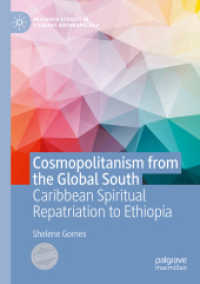- ホーム
- > 洋書
- > 英文書
- > Business / Economics
Full Description
The book explores the role of public market actors in sustainable and circular economy innovation and financing.
The shift to a circular economy requires active innovation, alongside radical changes in law, finance and policy considerations, since regulation is often tightly connected with the assumption of a linear model of consumption. Finance is crucial in creating sustainable and circular economy markets and innovations: public finance is important from the perspective of seeing the state as an engine for promoting sustainable innovations, but private funds are also required. Legislative initiatives for promoting repairs have been proposed or adopted in the EU, US and in Australia, representing remarkable steps forward but still leaving many obstacles without legislative intervention. This book examines circular economy regulation and policy on a comprehensive, general level, as well as assessing the regulatory possibilities of promoting the right to repair. Promotion of circular economy innovations as well as changing the practices and changing consumer patterns towards a more comprehensive adoption of CE are discussed from perspectives of legal, social and moral norms. The book critically evaluates current legislative reforms and assesses existing barriers to the circular economy and innovation in intellectual property law, consumer law and competition law.
Providing an in-depth analysis of this dynamic field, geared towards reconsidering both existing and prospective policies and regulatory regime, the book makes recommendations for solutions to legislative barriers. It is an indispensable resource for both researchers and practitioners working at the intersections of markets, innovations and sustainability.
Contents
1. Introduction
2. Innovations and Small and Medium-sized Enterprises for Sustainability and the Circular Economy
3. Financial Risks of Unsustainability: Digital Innovations
4. Sustainability Policies to Incentivize Data Driven Innovation
5. Opening Up Big Data for Sustainability: What Role for Database Rights in the Fourth Industrial Revolution?
6. An Access and Transfer Right (ATR) - A Different Form of Right to Data for the Internet of Things
7. 'Data Ownership' Ambiguity - to the Detriment of Sustainable Innovation
8. The Right to Repair in the United States
9. The Right to Repair in Australia
10. Shifting Normality - Regulation of Planned and Premature Obsolescence in Europe
11. Conclusions








